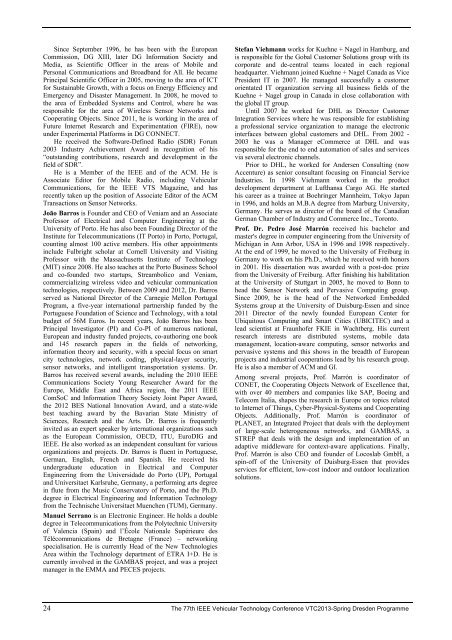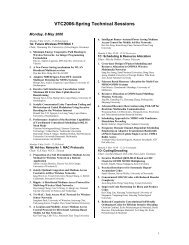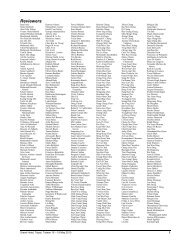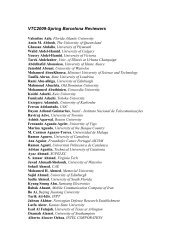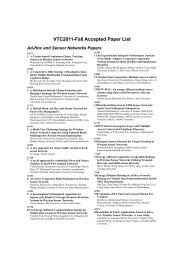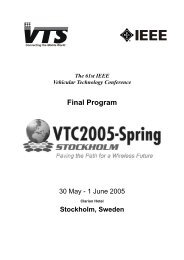Final Programme 2 â 5 June 2013 Dresden, Germany - ieeevtc.org
Final Programme 2 â 5 June 2013 Dresden, Germany - ieeevtc.org
Final Programme 2 â 5 June 2013 Dresden, Germany - ieeevtc.org
Create successful ePaper yourself
Turn your PDF publications into a flip-book with our unique Google optimized e-Paper software.
Since September 1996, he has been with the European<br />
Commission, DG XIII, later DG Information Society and<br />
Media, as Scientific Officer in the areas of Mobile and<br />
Personal Communications and Broadband for All. He became<br />
Principal Scientific Officer in 2005, moving to the area of ICT<br />
for Sustainable Growth, with a focus on Energy Efficiency and<br />
Emergency and Disaster Management. In 2008, he moved to<br />
the area of Embedded Systems and Control, where he was<br />
responsible for the area of Wireless Sensor Networks and<br />
Cooperating Objects. Since 2011, he is working in the area of<br />
Future Internet Research and Experimentation (FIRE), now<br />
under Experimental Platforms in DG CONNECT.<br />
He received the Software-Defined Radio (SDR) Forum<br />
2003 Industry Achievement Award in recognition of his<br />
“outstanding contributions, research and development in the<br />
field of SDR”.<br />
He is a Member of the IEEE and of the ACM. He is<br />
Associate Editor for Mobile Radio, including Vehicular<br />
Communications, for the IEEE VTS Magazine, and has<br />
recently taken up the position of Associate Editor of the ACM<br />
Transactions on Sensor Networks.<br />
João Barros is Founder and CEO of Veniam and an Associate<br />
Professor of Electrical and Computer Engineering at the<br />
University of Porto. He has also been Founding Director of the<br />
Institute for Telecommunications (IT Porto) in Porto, Portugal,<br />
counting almost 100 active members. His other appointments<br />
include Fulbright scholar at Cornell University and Visiting<br />
Professor with the Massachusetts Institute of Technology<br />
(MIT) since 2008. He also teaches at the Porto Business School<br />
and co-founded two startups, Streambolico and Veniam,<br />
commercializing wireless video and vehicular communication<br />
technologies, respectively. Between 2009 and 2012, Dr. Barros<br />
served as National Director of the Carnegie Mellon Portugal<br />
Program, a five-year international partnership funded by the<br />
Portuguese Foundation of Science and Technology, with a total<br />
budget of 56M Euros. In recent years, João Barros has been<br />
Principal Investigator (PI) and Co-PI of numerous national,<br />
European and industry funded projects, co-authoring one book<br />
and 145 research papers in the fields of networking,<br />
information theory and security, with a special focus on smart<br />
city technologies, network coding, physical-layer security,<br />
sensor networks, and intelligent transportation systems. Dr.<br />
Barros has received several awards, including the 2010 IEEE<br />
Communications Society Young Researcher Award for the<br />
Europe, Middle East and Africa region, the 2011 IEEE<br />
ComSoC and Information Theory Society Joint Paper Award,<br />
the 2012 BES National Innovation Award, and a state-wide<br />
best teaching award by the Bavarian State Ministry of<br />
Sciences, Research and the Arts. Dr. Barros is frequently<br />
invited as an expert speaker by international <strong>org</strong>anizations such<br />
as the European Commission, OECD, ITU, EuroDIG and<br />
IEEE. He also worked as an independent consultant for various<br />
<strong>org</strong>anizations and projects. Dr. Barros is fluent in Portuguese,<br />
German, English, French and Spanish. He received his<br />
undergraduate education in Electrical and Computer<br />
Engineering from the Universidade do Porto (UP), Portugal<br />
and Universitaet Karlsruhe, <strong>Germany</strong>, a performing arts degree<br />
in flute from the Music Conservatory of Porto, and the Ph.D.<br />
degree in Electrical Engineering and Information Technology<br />
from the Technische Universitaet Muenchen (TUM), <strong>Germany</strong>.<br />
Manuel Serrano is an Electronic Engineer. He holds a double<br />
degree in Telecommunications from the Polytechnic University<br />
of Valencia (Spain) and l’École Nationale Supérieure des<br />
Télécommunications de Bretagne (France) – networking<br />
specialisation. He is currently Head of the New Technologies<br />
Area within the Technology department of ETRA I+D. He is<br />
currently involved in the GAMBAS project, and was a project<br />
manager in the EMMA and PECES projects.<br />
Stefan Viehmann works for Kuehne + Nagel in Hamburg, and<br />
is responsible for the Gobal Customer Solutions group with its<br />
corporate and de-central teams located in each regional<br />
headquarter. Viehmann joined Kuehne + Nagel Canada as Vice<br />
President IT in 2007. He managed successfully a customer<br />
orientated IT <strong>org</strong>anization serving all business fields of the<br />
Kuehne + Nagel group in Canada in close collaboration with<br />
the global IT group.<br />
Until 2007 he worked for DHL as Director Customer<br />
Integration Services where he was responsible for establishing<br />
a professional service <strong>org</strong>anization to manage the electronic<br />
interfaces between global customers and DHL. From 2002 -<br />
2003 he was a Manager eCommerce at DHL and was<br />
responsible for the end to end automation of sales and services<br />
via several electronic channels.<br />
Prior to DHL, he worked for Andersen Consulting (now<br />
Accenture) as senior consultant focusing on Financial Service<br />
Industries. In 1998 Viehmann worked in the product<br />
development department at Lufthansa Cargo AG. He started<br />
his career as a trainee at Boehringer Mannheim, Tokyo Japan<br />
in 1996, and holds an M.B.A degree from Marburg University,<br />
<strong>Germany</strong>. He serves as director of the board of the Canadian<br />
German Chamber of Industry and Commerce Inc., Toronto.<br />
Prof. Dr. Pedro José Marrón received his bachelor and<br />
master's degree in computer engineering from the University of<br />
Michigan in Ann Arbor, USA in 1996 and 1998 respectively.<br />
At the end of 1999, he moved to the University of Freiburg in<br />
<strong>Germany</strong> to work on his Ph.D., which he received with honors<br />
in 2001. His dissertation was awarded with a post-doc prize<br />
from the University of Freiburg. After finishing his habilitation<br />
at the University of Stuttgart in 2005, he moved to Bonn to<br />
head the Sensor Network and Pervasive Computing group.<br />
Since 2009, he is the head of the Networked Embedded<br />
Systems group at the University of Duisburg-Essen and since<br />
2011 Director of the newly founded European Center for<br />
Ubiquitous Computing and Smart Cities (UBICITEC) and a<br />
lead scientist at Fraunhofer FKIE in Wachtberg. His current<br />
research interests are distributed systems, mobile data<br />
management, location-aware computing, sensor networks and<br />
pervasive systems and this shows in the breadth of European<br />
projects and industrial cooperations lead by his research group.<br />
He is also a member of ACM and GI.<br />
Among several projects, Prof. Marrón is coordinator of<br />
CONET, the Cooperating Objects Network of Excellence that,<br />
with over 40 members and companies like SAP, Boeing and<br />
Telecom Italia, shapes the research in Europe on topics related<br />
to Internet of Things, Cyber-Physical-Systems and Cooperating<br />
Objects. Additionally, Prof. Marrón is coordinator of<br />
PLANET, an Integrated Project that deals with the deployment<br />
of large-scale heterogeneous networks, and GAMBAS, a<br />
STREP that deals with the design and implementation of an<br />
adaptive middleware for context-aware applications. <strong>Final</strong>ly,<br />
Prof. Marrón is also CEO and founder of Locoslab GmbH, a<br />
spin-off of the University of Duisburg-Essen that provides<br />
services for efficient, low-cost indoor and outdoor localization<br />
solutions.<br />
24 The 77th IEEE Vehicular Technology Conference VTC<strong>2013</strong>-Spring <strong>Dresden</strong> <strong>Programme</strong>


